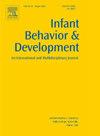利用眼动追踪和贝叶斯认知模型重新审视婴儿认知功能与母亲照顾质量之间的关系
IF 1.9
3区 心理学
Q3 PSYCHOLOGY, DEVELOPMENTAL
引用次数: 0
摘要
广泛的研究表明,高质量的护理在促进婴儿认知发展中的重要性。然而,目前尚不清楚婴儿认知功能的哪些具体方面与更高质量的照顾有关。在本研究中,我们将从眼动追踪数据中获得的多项婴儿认知测量与母亲照顾的情感和认知维度的个体差异联系起来。参与者为66名母亲及其婴儿(平均年龄:8.0个月,SD=1.1)。母亲与婴儿的互动(在换尿布和共同读书期间)被记录下来,随后由独立评分者观察,以评估母亲的护理质量。在视觉学习任务中收集的婴儿眼球追踪数据被用来为贝叶斯认知模型提供信息,并推断出个体在注意力、学习、处理速度和好奇心方面的差异。我们发现婴儿的注意力与母亲的照顾之间呈u型关系。注意力得分非常低和非常高的婴儿从母亲那里得到了更高质量的照顾,而得分中等的婴儿得到了更低质量的照顾。这可能表明,母亲会根据婴儿的注意力需求调整自己的照顾行为,为那些努力投入(低注意力得分)或脱离(高注意力得分)的婴儿提供更高质量的照顾。母亲照顾质量与任何其他认知测量无关。本文章由计算机程序翻译,如有差异,请以英文原文为准。
Revisiting associations between infant cognitive functioning and maternal caregiving quality using eye-tracking and Bayesian cognitive modelling
Extensive research demonstrates the importance of high-quality caregiving in promoting infant cognitive development. However, it remains unknown what specific aspects of infants’ cognitive functioning relate to higher quality of caregiving. In this study, we related multiple infant cognitive measures derived from eye-tracking data to individual differences in emotional and cognitive dimensions of maternal caregiving. Participants were 66 mothers and their infants (mean age: 8.0 months, SD=1.1). Mother-infant interactions (during a diaper change and joint book reading) were recorded and subsequently observed by independent raters to assess maternal caregiving quality. Infant eye-tracking data, collected during a visual learning task, were used to inform a Bayesian cognitive model and infer individual differences in attention, learning, processing speed, and curiosity. We found a U-shaped relation between infants’ attention and maternal caregiving. Infants with very low and very high attention scores received higher-quality caregiving from their mothers, while infants with intermediate scores received lower-quality caregiving. This may indicate that mothers adapt their caregiving behaviour to the attentional needs of their infants, providing higher-quality caregiving to infants who either struggle to engage (low attention scores) or disengage (high attention scores). Maternal caregiving quality was not associated with any other cognitive measure.
求助全文
通过发布文献求助,成功后即可免费获取论文全文。
去求助
来源期刊

Infant Behavior & Development
PSYCHOLOGY, DEVELOPMENTAL-
CiteScore
4.10
自引率
4.80%
发文量
94
期刊介绍:
Infant Behavior & Development publishes empirical (fundamental and clinical), theoretical, methodological and review papers. Brief reports dealing with behavioral development during infancy (up to 3 years) will also be considered. Papers of an inter- and multidisciplinary nature, for example neuroscience, non-linear dynamics and modelling approaches, are particularly encouraged. Areas covered by the journal include cognitive development, emotional development, perception, perception-action coupling, motor development and socialisation.
 求助内容:
求助内容: 应助结果提醒方式:
应助结果提醒方式:


